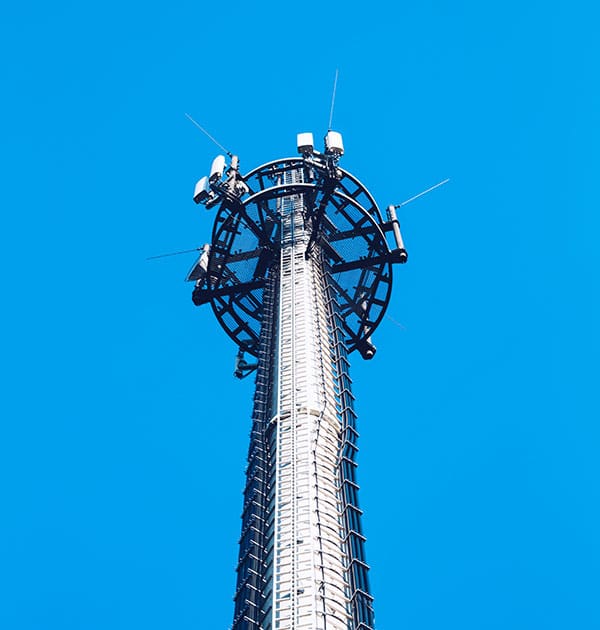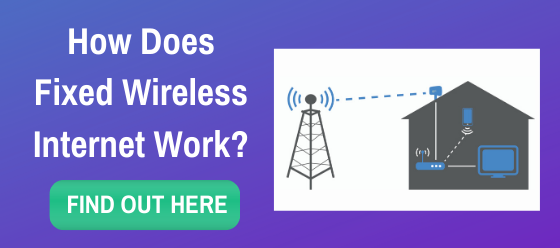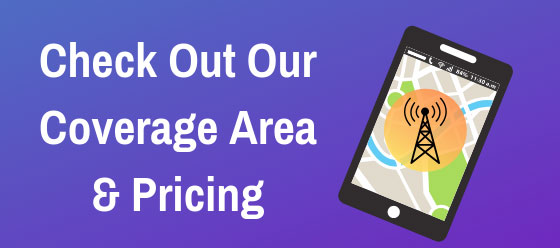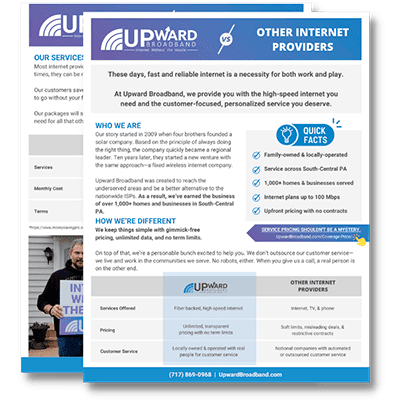
Fixed wireless internet is a quickly emerging alternative to traditional methods of connecting to the internet. It doesn’t depend on wires like cable, fiber, or DSL, and it is local instead of orbital like satellite internet.
With access to underserved and rural areas, fixed wireless internet or rural wireless internet offers a fiber-backed broadband option where there might not have been before. Most often locally owned, these companies are more likely to deliver great customer service and listen to your needs.
If you’re considering making the switch or would like to learn more about it, take a look at the pros and cons of fixed wireless internet.
The Pros of Fixed Wireless Internet:
1. Brings High-Speed Internet to Underserved Areas
2. Local Providers with Better Customer Service
3. Installation is Quick and Easy
4. It’s Reliable
5. It’s Fast
6. It’s Flexible
7. It Has Straight-Forward Pricing
The Cons of Fixed Wireless Internet:
1. It Has Line of Sight Limitations
2. It’s Not Always the Cheapest Option
3. The “Fixed” in Fixed Wireless Internet
The Pros: What’s Great About Fixed Wireless Internet
1. High-Speed Internet to Underserved Areas

One of the things we get really excited about at Upward Broadband is our ability to bring high-speed, broadband internet to homes and businesses in Lancaster and Chester counties that don’t currently have that option.
Because cable and fiber require substantial infrastructure investments to provide service, they often don’t expand into areas with less dense populations. Because fixed wireless internet’s setup is much less resource-intensive, we’re able to expand into underserved areas, like Oxford, Quarryville, Paradise, Gap, New Providence, and other nearby towns.
2. Local Providers, Better Customer Service
In April 2019, Comcast had 27.6 million broadband customers. In contrast, wireless internet service providers (WISPs) tend to be locally or regionally based with fewer customers – 1,200 on average, according to WISPA.
While partnering with larger companies certainly has its perks, so does working with smaller, local companies.
It’s easier for local providers to focus on their customers and build relationships with them, providing great customer service and an attentive team.
3. Quick and Easy Installations
If you’re within a fixed wireless internet provider’s service area with a clear line of sight, your service can be up and running within just days of making the first phone call. In most cases, all that’s required is the installation of a receiving device that connects to one of the access towers, or the point of presence (PoP), and a wired connection to your router.
4. It’s Reliable
With satellite internet, you’re at the mercy of the weather. With cable internet, severed cords can cause outages that could last for substantial periods of time. With fixed wireless internet, your connection is relatively safe from interference, even in poor weather conditions.
5. It’s Fast
Because most fixed wireless customers are within 10 miles of the PoP or access point, they’ll have fast internet that’s comparable to or better than most cable providers. Because the connection is local, you won’t experience the latency issues as with satellite, and your connection will generally be faster than DSL.
6. It’s Flexible
The internet that you need can change. Whether it’s because a growing family or growing business, you may need more bandwidth in the future, or allow more users access. Likewise, you may want to go with less bandwidth and fewer users. With a fixed wireless connection, your connection can be adjusted fairly easily, keeping things flexible so you can do what’s best for you.
7. It Has Straight-Forward Pricing
Most fixed wireless providers offer unbundled pricing, meaning you only pay for the internet you need – not all of the features you don’t really want or use. Additionally, many offer plans with no data limits, meaning you can do what you need to do when it comes to the web without having to worry about added fees or keep track of how much data you’re using.
The Cons: Where Fixed Internet Has Room to Improve
1. Line of Sight Limitations
Fixed wireless internet works by transmitting a fiber-optic-backed network via radio signals from a PoP to an antenna on your home or business. If there is not a clear line of site between your location and the PoP, you may have trouble connecting to your internet. Lines of sight can be obstructed by things like trees, buildings, or hills.
While there are ways around this, it’s possible that a WISP won’t be able to deliver internet to your location, even if you’re relatively close to the transmission tower.
The fixed wireless internet provider you’re looking to partner with will send a technician out to ensure you have a strong connection and a clear line of sight before progressing.
2. It’s Not Always the Cheapest Option
It’s possible that signing up for fixed wireless internet won’t be the cheapest option, depending on what other connection types are available in your area. However, it brings broadband internet to areas where it was otherwise not available, and you’ll have more control over what you pay for, instead of crazy bundles or gimmicky pricing.
3. The “Fixed” in Fixed Wireless Internet
While the radio waves wirelessly transmit from the access tower to your home or business, the connection is fixed to your building. This technology doesn’t support roaming.
If you’re a business or homeowner frustrated with your current internet provider or live in a rural area where broadband options are limited or nonexistent, fixed wireless internet could be for you.







[…] of the advantages of fixed wireless internet is that most providers allow you to change your plan easily. This […]